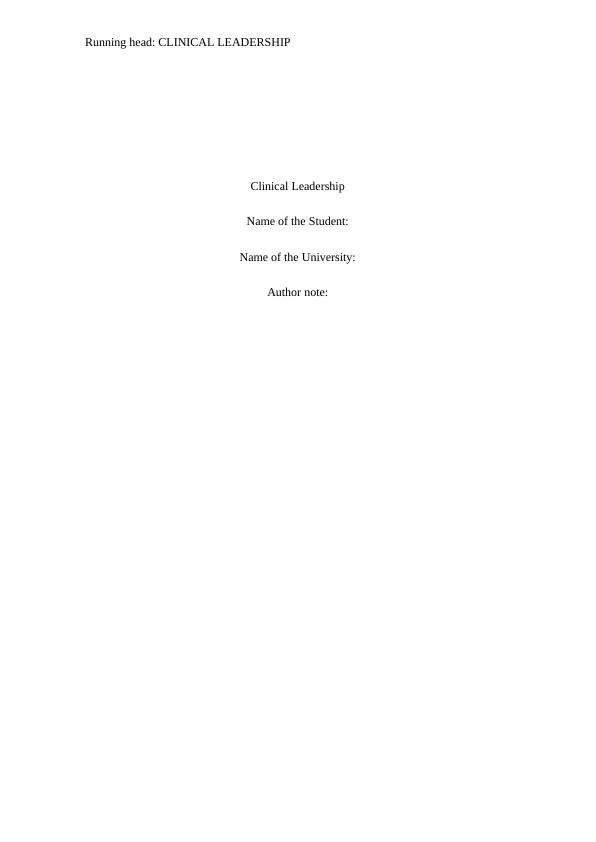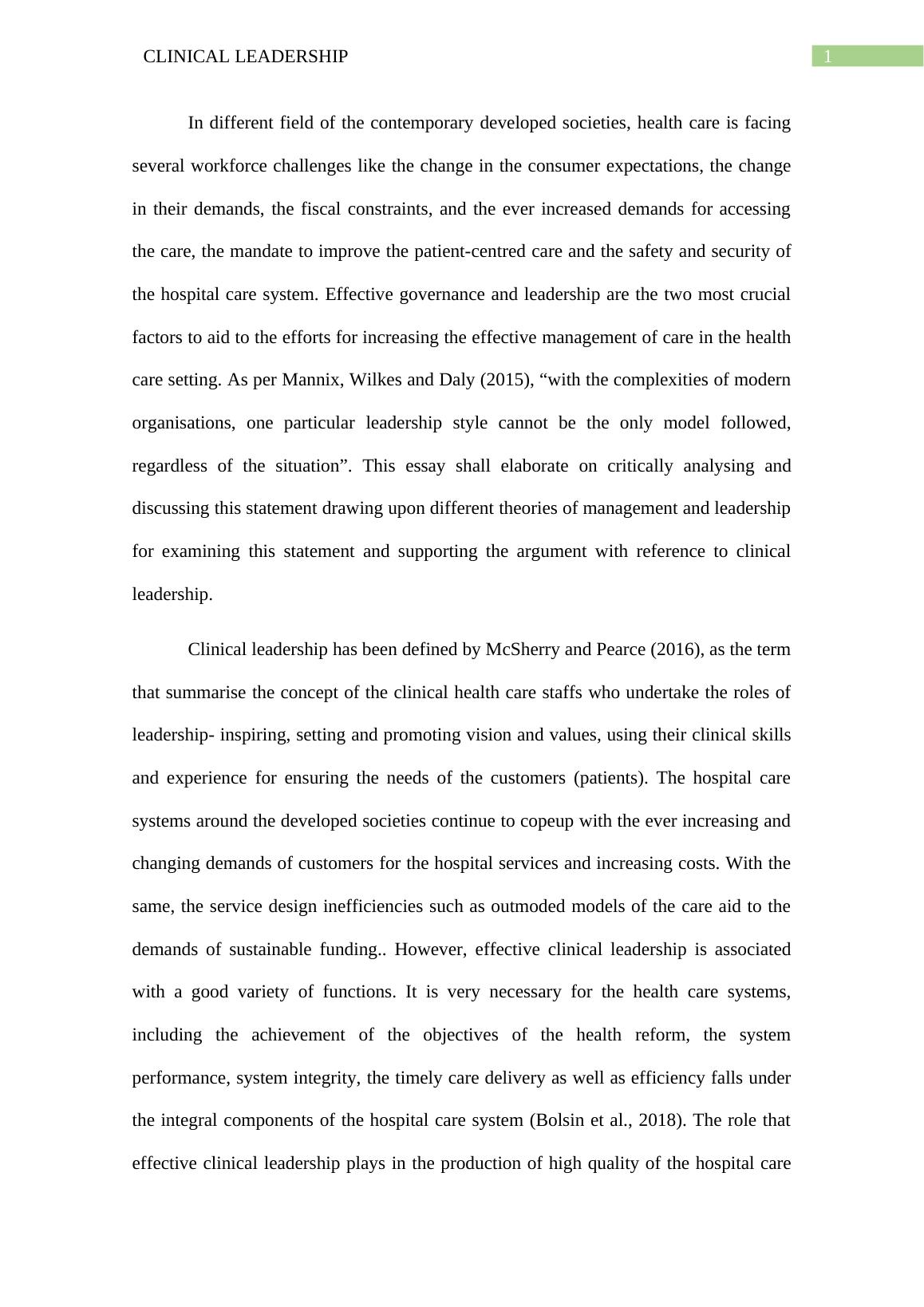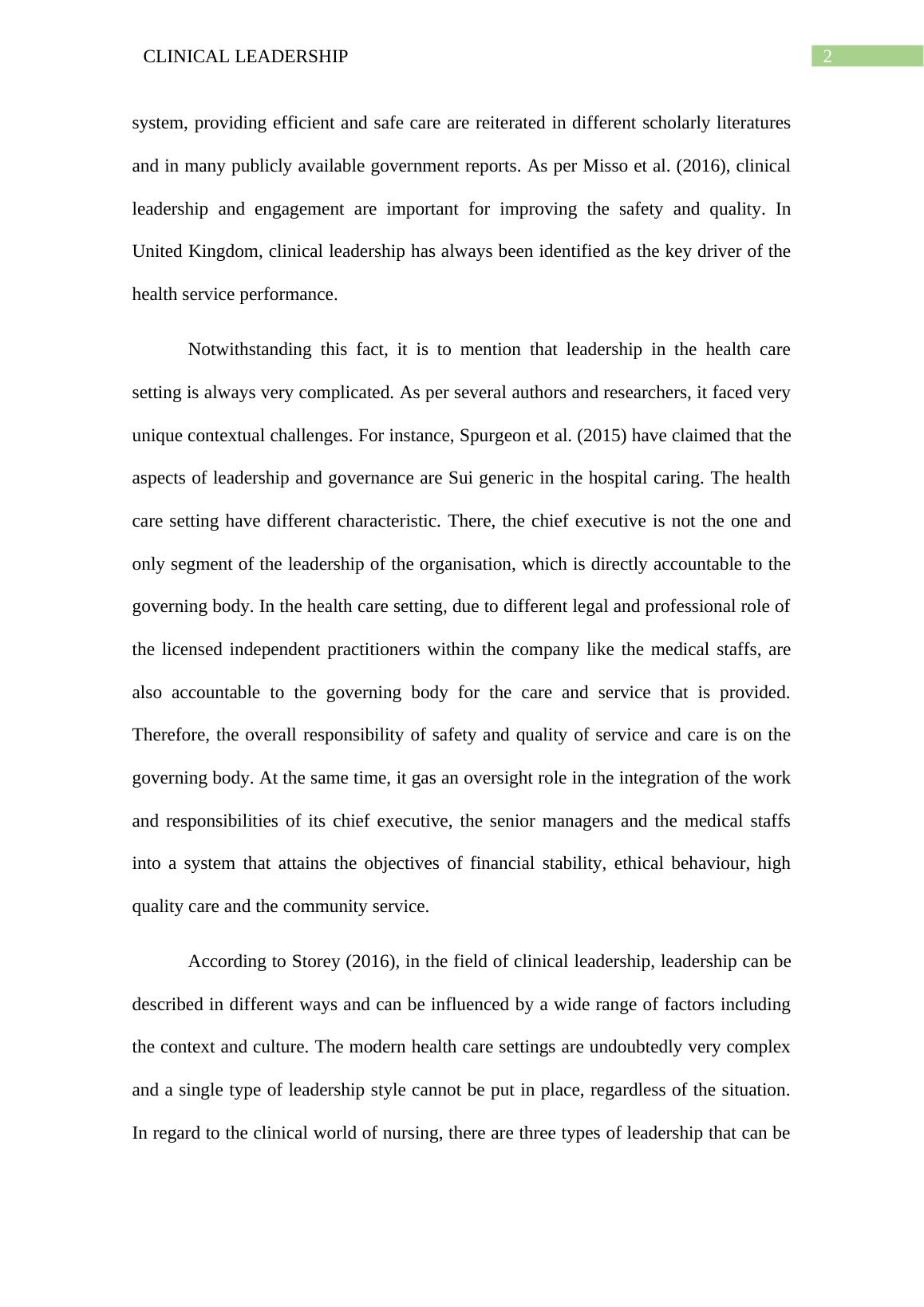Clinical Leadership
Added on 2023-01-18
8 Pages2091 Words78 Views
Running head: CLINICAL LEADERSHIP
Clinical Leadership
Name of the Student:
Name of the University:
Author note:
Clinical Leadership
Name of the Student:
Name of the University:
Author note:

1CLINICAL LEADERSHIP
In different field of the contemporary developed societies, health care is facing
several workforce challenges like the change in the consumer expectations, the change
in their demands, the fiscal constraints, and the ever increased demands for accessing
the care, the mandate to improve the patient-centred care and the safety and security of
the hospital care system. Effective governance and leadership are the two most crucial
factors to aid to the efforts for increasing the effective management of care in the health
care setting. As per Mannix, Wilkes and Daly (2015), “with the complexities of modern
organisations, one particular leadership style cannot be the only model followed,
regardless of the situation”. This essay shall elaborate on critically analysing and
discussing this statement drawing upon different theories of management and leadership
for examining this statement and supporting the argument with reference to clinical
leadership.
Clinical leadership has been defined by McSherry and Pearce (2016), as the term
that summarise the concept of the clinical health care staffs who undertake the roles of
leadership- inspiring, setting and promoting vision and values, using their clinical skills
and experience for ensuring the needs of the customers (patients). The hospital care
systems around the developed societies continue to copeup with the ever increasing and
changing demands of customers for the hospital services and increasing costs. With the
same, the service design inefficiencies such as outmoded models of the care aid to the
demands of sustainable funding.. However, effective clinical leadership is associated
with a good variety of functions. It is very necessary for the health care systems,
including the achievement of the objectives of the health reform, the system
performance, system integrity, the timely care delivery as well as efficiency falls under
the integral components of the hospital care system (Bolsin et al., 2018). The role that
effective clinical leadership plays in the production of high quality of the hospital care
In different field of the contemporary developed societies, health care is facing
several workforce challenges like the change in the consumer expectations, the change
in their demands, the fiscal constraints, and the ever increased demands for accessing
the care, the mandate to improve the patient-centred care and the safety and security of
the hospital care system. Effective governance and leadership are the two most crucial
factors to aid to the efforts for increasing the effective management of care in the health
care setting. As per Mannix, Wilkes and Daly (2015), “with the complexities of modern
organisations, one particular leadership style cannot be the only model followed,
regardless of the situation”. This essay shall elaborate on critically analysing and
discussing this statement drawing upon different theories of management and leadership
for examining this statement and supporting the argument with reference to clinical
leadership.
Clinical leadership has been defined by McSherry and Pearce (2016), as the term
that summarise the concept of the clinical health care staffs who undertake the roles of
leadership- inspiring, setting and promoting vision and values, using their clinical skills
and experience for ensuring the needs of the customers (patients). The hospital care
systems around the developed societies continue to copeup with the ever increasing and
changing demands of customers for the hospital services and increasing costs. With the
same, the service design inefficiencies such as outmoded models of the care aid to the
demands of sustainable funding.. However, effective clinical leadership is associated
with a good variety of functions. It is very necessary for the health care systems,
including the achievement of the objectives of the health reform, the system
performance, system integrity, the timely care delivery as well as efficiency falls under
the integral components of the hospital care system (Bolsin et al., 2018). The role that
effective clinical leadership plays in the production of high quality of the hospital care

2CLINICAL LEADERSHIP
system, providing efficient and safe care are reiterated in different scholarly literatures
and in many publicly available government reports. As per Misso et al. (2016), clinical
leadership and engagement are important for improving the safety and quality. In
United Kingdom, clinical leadership has always been identified as the key driver of the
health service performance.
Notwithstanding this fact, it is to mention that leadership in the health care
setting is always very complicated. As per several authors and researchers, it faced very
unique contextual challenges. For instance, Spurgeon et al. (2015) have claimed that the
aspects of leadership and governance are Sui generic in the hospital caring. The health
care setting have different characteristic. There, the chief executive is not the one and
only segment of the leadership of the organisation, which is directly accountable to the
governing body. In the health care setting, due to different legal and professional role of
the licensed independent practitioners within the company like the medical staffs, are
also accountable to the governing body for the care and service that is provided.
Therefore, the overall responsibility of safety and quality of service and care is on the
governing body. At the same time, it gas an oversight role in the integration of the work
and responsibilities of its chief executive, the senior managers and the medical staffs
into a system that attains the objectives of financial stability, ethical behaviour, high
quality care and the community service.
According to Storey (2016), in the field of clinical leadership, leadership can be
described in different ways and can be influenced by a wide range of factors including
the context and culture. The modern health care settings are undoubtedly very complex
and a single type of leadership style cannot be put in place, regardless of the situation.
In regard to the clinical world of nursing, there are three types of leadership that can be
system, providing efficient and safe care are reiterated in different scholarly literatures
and in many publicly available government reports. As per Misso et al. (2016), clinical
leadership and engagement are important for improving the safety and quality. In
United Kingdom, clinical leadership has always been identified as the key driver of the
health service performance.
Notwithstanding this fact, it is to mention that leadership in the health care
setting is always very complicated. As per several authors and researchers, it faced very
unique contextual challenges. For instance, Spurgeon et al. (2015) have claimed that the
aspects of leadership and governance are Sui generic in the hospital caring. The health
care setting have different characteristic. There, the chief executive is not the one and
only segment of the leadership of the organisation, which is directly accountable to the
governing body. In the health care setting, due to different legal and professional role of
the licensed independent practitioners within the company like the medical staffs, are
also accountable to the governing body for the care and service that is provided.
Therefore, the overall responsibility of safety and quality of service and care is on the
governing body. At the same time, it gas an oversight role in the integration of the work
and responsibilities of its chief executive, the senior managers and the medical staffs
into a system that attains the objectives of financial stability, ethical behaviour, high
quality care and the community service.
According to Storey (2016), in the field of clinical leadership, leadership can be
described in different ways and can be influenced by a wide range of factors including
the context and culture. The modern health care settings are undoubtedly very complex
and a single type of leadership style cannot be put in place, regardless of the situation.
In regard to the clinical world of nursing, there are three types of leadership that can be

End of preview
Want to access all the pages? Upload your documents or become a member.
Related Documents
Leadership in Preventing Nosocomial Infectionlg...
|12
|2936
|421
Impact of Effective Leadership on Healthcare Quality and Interdisciplinary Collaboration in Health Carelg...
|4
|888
|500
Importance Of Clinical Governance | Reportlg...
|10
|2253
|34
Effective Nursing Leadership for Implementing Electronic Health Recordslg...
|8
|2027
|372
Clinical Incidents in Nursing Assignmentlg...
|7
|1809
|29
Clinical Leadership and Professional Relationshiplg...
|9
|2315
|275